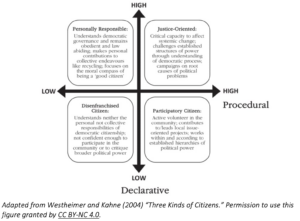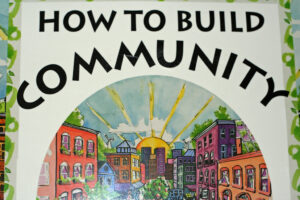Chapter 7: Good Citizens
What does “Good Citizen” mean?
As you reflect on the content of the text building to the term “good citizen” what sort of terms would you associate with this phrase? You could focus on a professional, academic, or political context or another perspective altogether. Research has attempted to define what it means to be a good citizen, review the characteristics below to see if it appropriately captures what the phrase means:
- Carry knowledge and values (Edling et al. 2020)
- Act with integrity to make society better, treat everyone equally, provided meaningful employment, and lower stress (McCartney & Parent)
- Balanced relationships, with positives and productive relationships (Santos et al., 2023).
Morals and Integrity
A good citizen involves morals. It is similar to core values in that morals are a standard of behavior, believes, or even what we “know” to be right or wrong. A good citizen means leading with morally correct behavior. Integrity, again is very similar; integrity means being honest and having strong morals. Morality is a complex concepts and Edling et al. (2020) provides a great outline for what morality means. Morality is:
- A web of relationships.
- Dependent on your personal awareness and education, as well as the associated consequences.
- Interelated to language and communication, which means it is likely imperfect because humans are imperfect.
- Recognizing all knowledge is valuable and involves risk.
Become a Community Focused Citizen
(Content remixed from Developing Human Potential by Matkin, et al., 2023).
How will you be a positive change in your community? Will your actions contribute to the common good? These are questions civic leaders ask themselves. All positive actions, whether small or big, can lead to strengthening our communities.
Westheimer and Kahne (2004) describe four kinds of citizens: (1) the personally responsible citizen; (2) the participatory citizen; (3) the justice-oriented citizen; and (4) the disenfranchised citizen. To better understand these concepts of citizenship, let’s look at voting rights in the United States. For example, as a personally responsible citizen, people vote in primary and general elections. As a participatory citizen, some serve as a voter registrar and assist a local non-profit in educating community members about the issues on the ballot, as well as to assist individuals in how to become registered to vote. A justice-oriented citizen, may be further interested in systemic positive changes to voter registration laws and will call, write, and visit with elected officials to ensure all voters have access; however, a disenfranchised citizen may not vote or participate in the process at all because they feel they do not have the necessary information or feel that the current process is not inclusive for them. These types of citizens are described in Figure 1.

Becoming a Community-Focused Leader

What does it mean to be a civically minded leader? How do you see others making a difference in the community? Is it through their service to one or many causes, organizing a food drive, voting rights, or being a good steward through philanthropy? Practicing the ideas behind civic engagement and being a leader who seeks to bring out the best in self, in others, and in their community is difficult work. A focus on respecting your values and the values of others allows leaders to be confident in their leadership roles and engagement.
Learning about the foundations of leadership and interpersonal skills are vital to our understanding of ourselves as a leader and our capacity to be a leader in our organizations, in classrooms, in the workplace, across industries, and in our communities. Being aware of who we are and how we represent our authentic selves to others is of foremost importance in building on our abilities to be a leader. The self-concept and self-esteem we have for ourselves are, in fact, our own foundation and are imperative to opening ourselves up for the lessons of this text. As we dig deeper into our values, we find out what is important to us and how to drive our passion to serve others and our communities. You have also been challenged to define your own understanding of leadership and set up your own vision and your personal goals.
Communication seems like a simple act, but you have read, and no doubt discussed with others, how the act itself is complex and requires us to tap into our other skills and consider the ways we work with people. Being an effective communicator calls on us to use active listening and to process the message we are trying to relay to others. We must consider the contexts of the situation and tap into our understanding of nonverbal communication as well. When we know how others prefer to communicate and how we can better communicate with others, we become a more impactful leader and member of a team or community.

Trust is one of the foundations of any relationship. Building trust can take time to develop with others and requires us to become vulnerable with others. This can mean we have to open ourselves to others and tap back into our active listening skills so they feel comfortable being vulnerable with us. You will experience trust in various forms throughout your entire life. It’s a fundamental – and often unspoken – part of being an impactful leader and will determine how you live to be your authentic self with others, at work, and in your future community. Trust also plays into how we perceive others and explore our own perceptions throughout life.
Working with others requires us to understand their individual stories and the parts of their culture that we see, but also those parts of someone’s diversity that we cannot always visibly see. The idea of surrounding yourself with diverse individuals and making sure, as a leader, you work to include others by creating spaces where individuality is celebrated, and people are allowed to be versions of their best selves will truly impact the way you navigate as a leader. Tapping into your understanding of others and using your own emotional intelligence shows others that you are genuine and value people. Half of the battle of working in a group or team is showing your trust in those you surround yourselves with, and this asks you to be a leader who values communication and ensures equity exists for everyone to be involved in the work to be done.

Leadership is not always easy. Sometimes it requires us to tap into empathy so we can understand the experiences of others to make the best decisions in the moment and to help edit our response and behavior when we work with individuals. Because we are all complex individuals, conflict is inevitable in some form, and that is not a bad thing. Conflict can make us find innovative ways of doing our work and bring about creativity and improved task response. Through understanding our own personal leadership components discussed in this book, we become more informed about how to take the best parts of ourselves and apply it in a bigger application of leadership. Leaders who understand themselves and have a good appreciation of their talents and abilities make the best leaders and increase their capacity to lead others around them.
References
Edling, S., Sharp, H., Lofstrom, J., & Ammert, N. (2020). The good citizen: Revisiting moral motivations for introducing historical consciousness in history education drawing on the writings of Gadamer. SAGE Journal, 19(2). https://doi.org/10117/2047173420936622
Matkin, G., Headrick, J., & Sunderman, H. (2023). Developing human potential. Retrieved on October 20, 2023 from https://pressbooks.nebraska.edu/developinghumanpotential/chapter/leadership-civic-engagement-becoming-the-change-maker/
McCartney, S., & Parent, R. (n.d.). Ethics in law enforcement. Retrieved on October 20, 2023 from https://opentextbc.ca/ethicsinlawenforcement/chapter/the-importance-of-ethical-behaviour/
Porath, C. (2019). Why being respectful to your coworkers is good for business [Video]. YouTube. https://www.youtube.com/watch?v=YY1ERM-NIBY

